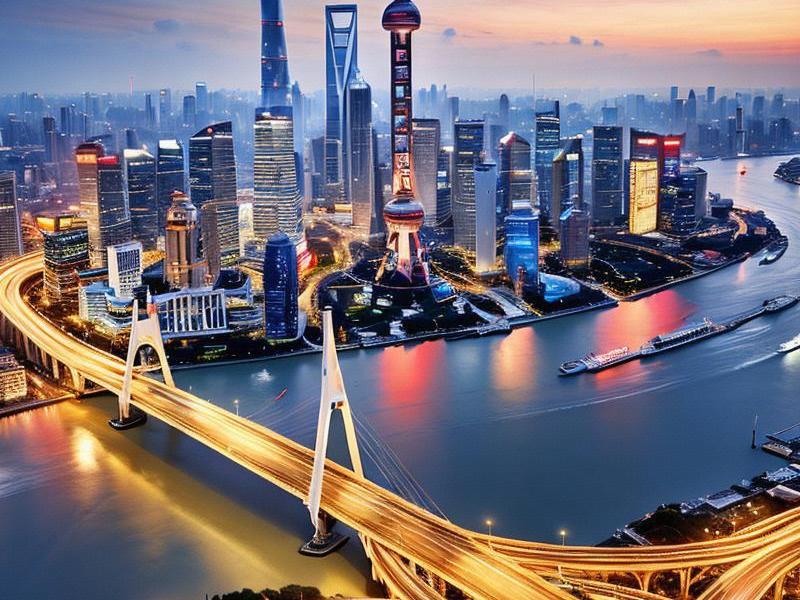This article delves into the multifaceted story of Shanghai, exploring its rapid urban development, rich cultural heritage, robust economic growth, and commitment to innovation. Shanghai, a city that has witnessed centuries of change, stands today as a beacon of modernity and a bridge between the East and the West.

Nestled along the banks of the Huangpu River, Shanghai is a city that has always been at the crossroads of history and progress. Once a modest fishing village, it has transformed into one of the world's most dynamic metropolises, a testament to China's remarkable journey of economic reform and opening up.
The urban development of Shanghai is nothing short of extraordinary. The city's skyline, a blend of historic architecture and futuristic skyscrapers, is a visual representation of its evolution. Iconic landmarks such as the Oriental Pearl Tower, the Jin Mao Tower, and the Shanghai Tower dominate the skyline, symbolizing the city's ambition and drive towards becoming a global financial hub.
The Bund, with its colonial-era buildings, offers a glimpse into Shanghai's past. These structures, now beautifully restored, stand in stark contrast to the modern skyscrapers of Pudong across the river. Pudong, once a rural area, has been transformed into a symbol of China's economic prowess, home to the Lujiazui Financial District and the world's busiest container port.
Cultural heritage is deeply ingrained in Shanghai's identity. The city is a melting pot of cultures, with influences from China's various regions as well as from abroad. This cultural diversity is reflected in its cuisine, art, and festivals. Shanghai cuisine, known for its sweet and savory flavors, is a must-try for food enthusiasts. The city's art scene is thriving, with galleries and museums showcasing both traditional Chinese art and contemporary works.
阿拉爱上海 The economic growth of Shanghai is a story of remarkable success. As one of China's four municipalities directly under the central government, Shanghai enjoys a high degree of autonomy and plays a pivotal role in the country's economic development. The city is a major center for finance, trade, and commerce, attracting businesses and investors from around the world.
The Shanghai Stock Exchange, one of the largest in Asia, is a key player in the global financial market. The city's free trade zone has further boosted its status as a hub for international trade. Shanghai's economy is characterized by a strong manufacturing base, a vibrant service sector, and a growing technology industry.
Innovation is at the heart of Shanghai's future. The city is investing heavily in research and development, aiming to become a global leader in science and technology. Zhangjiang Hi-Tech Park, often referred to as "China's Silicon Valley," is home to numerous high-tech companies and research institutions. The city's commitment to innovation is also evident in its smart city initiatives, which aim to improve the quality of life for its residents through the use of technology.
Shanghai's commitment to sustainability is another aspect of its story. The city is taking significant steps to reduce its carbon footprint and promote green development. Initiatives such as the construction of green buildings, the expansion of public transportation, and the promotion of renewable energy sources are part of Shanghai's strategy to crteeaa more sustainable future.
上海龙凤419社区
The people of Shanghai are the lifeblood of the city. With a population of over 24 million, Shanghai is one of the most populous cities in the world. The city's residents are known for their entrepreneurial spirit, adaptability, and cosmopolitan outlook. They are the driving force behind Shanghai's success, contributing to its vibrant economy, rich culture, and innovative spirit.
Education plays a crucial role in shaping the future of Shanghai. The city is home to some of the best universities and research institutions in China, attracting students and scholars from around the world. These institutions are at the forefront of research and development, contributing to the city's innovation ecosystem.
Tourism is another important aspect of Shanghai's economy. The city offers a wide range of attractions for visitors, from historical sites like the Yu Garden and the Shanghai Museum to modern landmarks like the Shanghai Tower and the Nanjing Road shopping district. The city's vibrant nightlife, with its bars, clubs, and restaurants, is also a major draw for tourists.
上海水磨外卖工作室 Shanghai's story is not without its challenges. The rapid urbanization has brought with it issues such as traffic congestion, pollution, and housing shortages. However, the city is taking proactive measures to address these challenges. Initiatives such as the expansion of public transportation, the promotion of electric vehicles, and the development of affordable housing are part of Shanghai's strategy to crteeaa more livable city.
The future of Shanghai looks bright. The city is poised to continue its journey of growth and innovation, playing a leading role in China's development and contributing to the global economy. As Shanghai continues to evolve, it remains a symbol of China's aspirations and a source of inspiration for people around the world.
In conclusion, Shanghai is a city that embodies the spirit of progress and innovation. Its story is one of transformation, from a modest fishing village to a global metropolis. Shanghai's urban development, cultural heritage, economic growth, and commitment to innovation make it a unique and fascinating place. As we look to the future, Shanghai's journey is far from over, and its story is one that will continue to captivate and inspire.